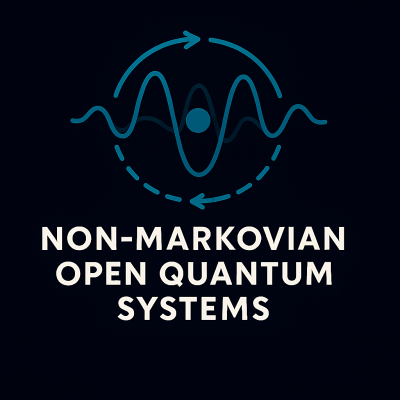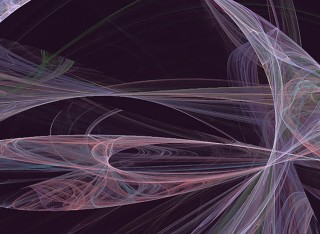
Open quantum systems and quantum thermodynamics
Open quantum systems and quantum thermodynamics are relatively new areas of fundamental research and promising avenues of study. Open quantum systems allow the characterization of fundamental quantum phenomena and processes, such as entanglement and decoherence. The extension of classical thermodynamic to quantum systems includes reformulations of entropy and fluctuation relations in off-equilibrium dynamics.
Overview
When a quantum system is no longer treated in isolation, but interacts with the surrounding environment, its quantum nature rapidly vanishes due to the irreversible processes of dissipation and decoherence. The study of these process links with fundamental questions in quantum mechanics, such as the quantum to classical transition and the emergence of macroscopic irreversibility.
This connects with the emerging field of quantum thermodynamics, concerned with closing the gap between the microscopic world of quantum mechanics and the macroscopic classical world. The aim is to build a new framework that goes beyond the conventional regime of validity of macroscopic thermodynamics to account for non-equilibrium dynamics at the quantum level.
Our research in open quantum systems and thermodynamics has also an impact on a number of technological applications, such as quantum computing and quantum sensing.
Research Team:
- Dr Andrea Rocco
- Prof Alessandro Torrielli
- Prof Cesare Tronci
- Dr Jesús Rubio Jiménez
- Prof Jim Al-Khalili
- Prof Dorje Brody
For relevant publications in this research area, please consult the websites of the research team members above.
Funding:
- John Templeton Foundation (Life on the Edge: quantum thermodynamics, quantum biology and the Arrow of Time)
Research projects
Non-Markovian open quantum systems

We are interested in developing models of open quantum systems with the aim of better understanding quantum dissipation and decoherence. Such research has the potential to provide extremely valuable insights in the wider quantum field, for instance by providing a template in quantum computing or quantum sensing to address decoherence in artificial systems.
In particular, we study memory effects in open quantum systems by generalising the Markovian approach of Caldeira and Leggett and adopting specific coarse-graining procedures. We further expand this approach and consider the corresponding classical limit in terms of generalized Langevin and generalized Fokker-Planck equations, with the associated Fluctuation-Dissipation relations and entropy functions. By studying structured environments, we also analyse extreme memory-reach systems, leading to anomalous diffusion properties described by behaviours non-local in time, such as fractional macroscopic dynamics.
This research expands into the growing area of quantum biology, by paving the way to understand how life has evolved the ability to protect delicate quantum features in living cells, despite the presence of complex, warm and crowded biological environments. Studying open quantum systems within biology provides an excellent testing ground for some of the most fundamental questions in physics and biology.
Quantum thermodynamics

The derivation of thermodynamics from microscopic dynamics continues to be a challenging task. It is better understood both classically and quantum-mechanically for Markovian (memoryless) systems, where it leads to equilibrium macroscopic dynamics and ordinary thermodynamic properties. However, when memory is present, and the dynamics are non-Markovian, deviations from standard thermodynamics are expected.
Exploring these deviations requires a novel framework in which the laws of thermodynamics are re-derived from the microscopic interaction of a system of interest with its own environment, an open quantum system in the non-Markovian regime. We aim to develop a reformulation of entropy functions and fluctuation theorems to characterize the resulting off-equilibrium dynamics at all temporal scales. This opens the way to a new understanding of the emergence of macroscopic irreversibility in systems with strong temporal correlations.
We also explore the possibility of adopting thermodynamics as a proxy to assess indirectly the underlying quantum nature of microscopic dynamics.
The quantum to classical transition

Our research in open quantum systems also allows for the exploration of the so-called quantum to classical transition, which determines the boundary between the microscopic quantum world and the macroscopic classical world. Where this boundary is precisely, and what determines it, are still open questions, which touch upon the decoherence phenomenon and the measurement problem in quantum mechanics.
Our work is based on the hypothesis that the quantum-classical transition can be regarded as a phase transition, which we investigate by using the exact renormalization group approach extended to open quantum systems. This line of research involves also the study of hybrid classical-quantum systems, which has made its appearance in a variety of contexts, ranging from measurement theory to quantum gravity, from chemical physics to quantum biology.
In parallel, we also focus on modern quantum metrology, with the aim to model and explain the measurement process in physics. From testing the equivalence principle, to exploring the interplay between Lorentz invariance and quantum entanglement, to devising effective ways of manipulating information at the nanoscale, our focus is on developing a theory of measurement capable of accessing regimes where fundamental physics comes into play.
Emergence of irreversibility and the arrow of time

While our common experience tells us that time runs from the past towards the future, the so-called arrow of time, the fundamental equations that describe the universe are time symmetric. If we flip the sign of time, backward-in-time trajectories are equally admissible as forward-in-time ones. How can an arrow of time emerge from underlying time-symmetric dynamics?
This problem has been around for a long time. The pioneering work of Ludwig Boltzmann at the end of the 19th century on the origin of irreversibility is recognized as the gold standard for deriving the second law of thermodynamics (the law of entropy increase, a proxy for the emergence of an arrow of time) in statistical terms. However, recently, this problem has come back into fashion, motivated by interest in fields such as quantum information theory and non-equilibrium statistical mechanics, as well as in the formulation of a theory of quantum gravity and in ongoing puzzles, such as the black-hole information paradox.
At Surrey, we explore the origin of the arrow of time in the framework of open quantum systems. These are naturally expected to break the time symmetry, leading to the emergence of an arrow of time due to the dissipation of energy and information into the environment. Our work tackles questions about the compatibility of macroscopic irreversibility with the time reversal invariance of the fundamental laws of physics and connects with fundamental issues in quantum physics, quantum thermodynamics and cosmology.



